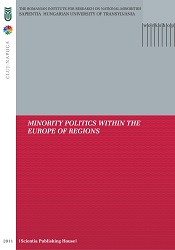Contemporary Minority Protection in Europe: Collision and Harmony between National and International Law
Contemporary Minority Protection in Europe: Collision and Harmony between National and International Law
Author(s): Ana Pavlović
Subject(s): Politics / Political Sciences
Published by: Scientia Kiadó
Keywords: minority rights; contemporary international agreements; United Nations; Council of Europe; European Union; OSCE; globalisation; minority policies
Summary/Abstract: In the introduction of her paper, the author brings up the history of minority protection briefly recalling its most important moments. In addition, she explains what minority rights mean today and stresses on the most relevant parts of contemporary international agreements concluded under the auspices of the United Nations, the Council of Europe, the European Union, and the OSCE. The main part of the paper is dedicated to the tension between the state and the international community, as well as how this collision is contributes to the minority question. Does the fact that the state delegates many of its responsibilities to other members of the international community, to the regions, mean that some day it will die out conceptually? The author discusses why this will probably never happen and why the state should be strong and effective. This stands for a democratic and responsible state, one that can become a suitable model for the region of Central and Eastern Europe. Globalisation is placing many challenges in front of the governments and old state theory is not enough anymore; therefore, states should reconceptualise themselves in order to survive. One of the key issues here is the necessity to transfer some of the power from the top to the middle levels, which implies different forms of selfrule and autonomy. This is precisely the issue that casts a new light on minority question, leaving us in doubt why the process is going easily in some countries while others fight strongly against it. The leading idea of this work is to point out that nowadays, in the 21st century, with numerous newly emerging demands our reflections on this issue must also change and evolve according to the present state of affairs. While the international organisations will obviously continue to seek better solutions, the primary responsibility for minority policies will remain with the state itself.
Book: MINORITY POLITICS WITHIN THE EUROPE OF REGIONS
- Page Range: 237-249
- Page Count: 13
- Publication Year: 2011
- Language: English
- Content File-PDF

